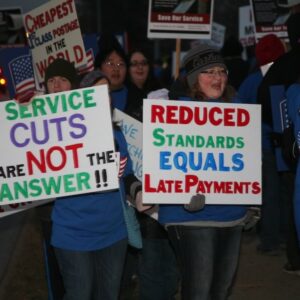November 9, 2011
Senate Panel Approves Postal Legislation
A Senate committee approved postal legislation that would severely weaken the USPS, by a vote of 11 to 6 on Nov. 9.
The 21st Century Postal Service Act (S. 1789) would give the USPS short-term financial relief, but it also would force the agency to dismantle its retail and mail-processing network, APWU President Cliff Guffey said.
“Mail will be delayed as a result of the elimination of hundreds of mail processing facilities and thousands of post offices, stations and branches,” he said. The bill also would allow the USPS to eliminate Saturday mail delivery after two years and would degrade delivery to customers’ doors no later than 2015.
“These drastic cuts will severely damage the Postal Service. It will make the USPS less relevant and drive away customers,” Guffey said.
The bill would return approximately $7 billion in overpayments the USPS made to the Federal Employees Retirement System (FERS), but it would not return $50 billion to $75 billion in overpayments to the Civil Service Retirement System (CSRS). Two independent actuarial studies concluded that the USPS has overpaid the CSRS account by $50 billion to $75 billion.
Earlier bills introduced by Democratic Sen. Tom Caper (DE) and Republican Sen. Susan Collins (ME) both contained provisions that would return the CSRS overpayments, but the new “compromise” bill excludes that provision. (The Government Accountability Office [GAO] issued a report in October that did not specifically refute the overpayments, but concluded that the overpayments did not violate federal law.)
In addition, although the bill would restructure required payments to pre-fund healthcare benefits for future retirees, it would not do enough to relieve the Postal Service of the pre-funding obligation, Guffey said. No other government agency or private company is required to make these payments.
“By failing to provide more substantial financial relief, S. 1789 will harm the USPS and its customers,” the union president said. “The Postal Service desperately needs funds to modernize its mail processing and retail networks, so it can continue to serve the American people.”
Several other provisions of the bill are deeply troubling to the APWU:
It would dramatically reduce the compensation of employees who are injured on duty, once they reach retirement age.
The bill also would require arbitrators in postal labor negotiations to consider the financial health of the USPS. Postal unions note that arbitrators have routinely done so for 40 years, and criticize the provision as an attempt to skew contract negotiations in favor of management in order to wrest wage and benefit reductions from postal employees.
“We will work to improve the bill when it comes to a vote before the full Senate,” Guffey said. “APWU members must remain vigilant and let their senators know about our concerns.”
Several alternative bills have been introduced in Congress, he noted, and varying proposals are being presented to the congressional super-committee that is charged with reducing the nation’s deficit.
Mandatory Overtime to End Soon for Many
Beginning Nov. 23, 2011, mandatory overtime will end for many APWU-represented employees.
In accordance with the 2010-2015 Collective Bargaining Agreement, full-time regular career Clerk Craft and Motor Vehicle Craft employees who work in an installation and functional area with Non-Traditional Full-Time assignments cannot be required to work overtime (except in an emergency), unless they are on the Overtime Desired List. If just one clerk in any station or branch occupies a NTFT duty assignment, clerks working in Function 4 throughout the installation cannot be required to work mandatory overtime unless they are on the OTDL. If only one clerk in mail processing occupies a NTFT duty assignment, then no non-OTDL clerks in Function 1 can be required to work mandatory overtime.
There is no “December exception” for this mandatory overtime prohibition.
“Emergencies” are defined in Article 3 as, “An unforeseen circumstance or a combination of circumstances which calls for immediate action in a situation which is not expected to be of a recurring nature.”



